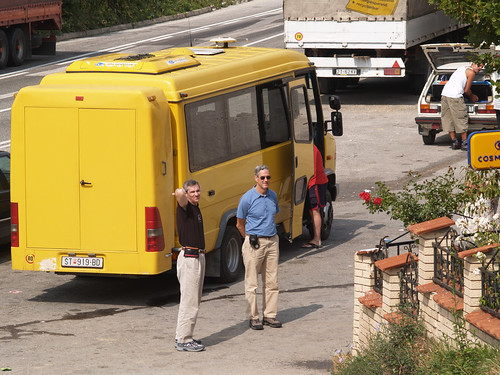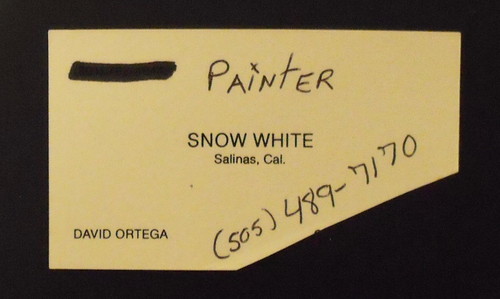We’ve just gotten off the Red Line and are waiting to cross Lomas when he asks me where the bus stop is. I point to the bench across the street, to the left of the intersection.
“Figures,” he says. It’s in the full sun, and it is a hot July afternoon.
“And they wonder why public transportation doesn’t work around here.”
He’s got wraparound sunglasses and a black push broom of a mustache. I’d taken him for a Latino native son until he opened his mouth. The accent is down home Southern white.
We cross the street. I slow a bit so he can keep up. He looks to be in his early 40s, but he’s got a cane, and he walks with a pronounced limp.
On the other side, we skip the bench and head for the shade of a nearby tree.
He didn’t like our bus driver.
“I ask him if this bus goes to Coronado, and he asks me if I’m plannin’ to git off the bus. I tell him I will if he’ll open the ______ door.”
“I will” sounds like “Ah wheel.” It is a lazy drawl, and it would be understandable if someone who didn’t know the language mistook it for calm.
It is not calm.
I tell him I’m surprised. The drivers are usually pretty helpful.
He tells me if he’d’ve been somewhere else, he’d’ve just shot him.
“Vet” flashes through my mind. I ask him where “somewhere else” might be.
“‘Fganistan.” Pause. “Eye-rack.”
He says he shot some people over there, and it was all for the best. But the service didn’t see it that way.
I said they probably figured it wasn’t the best way to go about winning the hearts and minds.
He said he wasn’t trying to win any hearts and minds. He finally figured out the only way to get home was to “kill ‘em all and let God sort ‘em out.”
He’s pretty sure it was his attitude on this matter, and not his 20 years or his knee full of shrapnel that led to his being turned down for another tour in Afghanistan.
“I told ‘em I could go another ten years, but they said ‘we don’t think so.’”
They told him he had mental problems. After two tours in Iraq and three in Afghanistan, why would they think anybody would have mental problems, he asks. It’s sarcastic, but he has a fine way of making it sound understated, as if he’s no longer invested in the anger.
He says he joined in time to go to Granada. Then Panama. Then Iraq. Then Afghanistan. Then Iraq. Then Afghanistan two more times. He’s been out three years.
I’m thinking Granada was sometime during Reagan’s first term. That would have put him in the service somewhere between 1980 and 1984. Which in turn would make him a 20-plus year veteran.
(Later, I will google Granada. The invasion was on October 25, 1983. With his “three years” ago retirement, that would give him at least 25 years.)
I ask him if the cane has anything to do with the shrapnel in his knee.
“Yes, sir.”
He says they told him the VA would fix him right up. He’s been on a list for three years now.
He answers “Yes, sir” again when I ask if he has any family here in town. Then he adds, “in a manner of speakin’.”
There is a pause.
“Haven’t seen much of ‘em.”
Another pause.
They would have preferred he’d re-enlisted, “for the pension.”
I don’t get this, but I do get the same lazy drawl, and that if it weren’t for the words, someone just listening to the sound of his voice could miss the bitterness.
He says he’s been out of work ever since he retired. Who’s gonna hire a person with mental problems, he asks me.
It’s the first time he’s looked at me. The rest of the time, he’s kept his face due west, where the bus will be coming.
I answer I don’t know. I’m halfway preoccupied with wondering what kind of disability benefits he might be eligible for, and with whether any of what he’s telling me is true.
He says if they’d fix his knee, he could get a job as a mercenary.
I say that doesn’t sound like much of a retirement.
“It’s perfect,” he replies. “Every day, you either win or die.”
Then he tells me the bus is coming.
And it is, and eventually does.
He boards first and takes a seat up front. I head for the back, and touch his shoulder and wish him good luck.
Truth is, I’m glad to be separating. I’ve been uncomfortable most of our time together. Not scared, just uncomfortable.
I think about this exchange the whole ride home, and I come to this conclusion: I don’t know how much, if any at all, his story is factual. But there’s no doubt in my mind he’s told me the truth.
He’s told me he’s feeling near the end of his rope, estranged from family and society, prematurely used up, physically impaired, slapped with a label that makes him impotent and dependent, bedeviled by bureaucracies and minor authorities, and the reason his anger sounds enervated is because it is turning to rage.
I’m thinking this is a guy who could go off one of these days and let God sort it all out.
I’m thinking he could use some help, or at least a friend.
But I’m not qualified to know, never mind offer, whatever kind of help he might need. And I am wary of inviting some sort of personal relationship.
The simple truth is I don’t want to get involved.
I don’t want to be the Good Samaritan.
And he’s still out there, doing a slow burn.
All of these make me uncomfortable.




